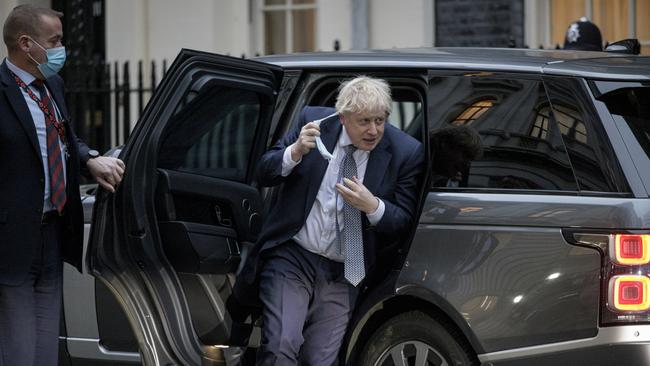Boris Johnson faces police interview over Downing Street parties
The senior civil servant who is overseeing an inquiry triggered the formal investigation when she handed evidence to detectives.

British Prime Minister Boris Johnson faces being interviewed by police after Scotland Yard said Downing Street parties crossed the threshold for a “serious and flagrant” breach of lockdown rules.
Sue Gray, a senior civil servant who is overseeing an inquiry into the events, triggered the formal investigation when she handed evidence to detectives.
Mr Johnson now faces being interviewed by the police, either under caution or as a witness. Officers are said to be investigating eight parties and could issue fines.
Mr Johnson is preparing to publish Ms Gray’s report as soon as Wednesday night before making a statement to the House of Commons. Her investigation has examined a series of events, among them a birthday celebration for Mr Johnson in Downing Street in June 2020 when social gatherings indoors were banned.
A month earlier, Mr Johnson attended “socially distanced drinks in the No. 10 garden” after his private secretary invited 100 Downing Street staff by email. Mr Johnson has been accused of lying to parliament over the events.
Conservative MPs who are considering submitting letters expressing no confidence in Mr Johnson have said they will wait until after the report has been published before making a decision.
Policing sources said that it “appears inevitable” Mr Johnson would have to speak to detectives during their investigation, which could last for months.
On Tuesday night, Sky News reported that photographs of Downing Street parties had been handed to Ms Gray, including images of Mr Johnson.
Mr Johnson would be the first sitting prime minister to be interviewed by detectives since 2006 when Labour’s Tony Blair was questioned as a witness as part of the cash-for-honours scandal. Mr Blair is believed to be the only serving prime minister ever questioned by police conducting a criminal investigation. According to reports at the time, he was clear that if he were interviewed under caution he would have to resign.
Mr Johnson is likely to be interviewed under caution if police suspect him personally of breaching lockdown rules. Otherwise he could be interviewed as a witness. Interviews under caution are a formal process in which suspects are read their rights, including to remain silent and to have legal representation.
Breaches of Covid-19 restrictions are among the least serious criminal offences that result in a fixed penalty notice. Matters have reached court only when suspects refused to pay. A FPN is not a criminal conviction and so does not result in a criminal record but can be recorded on the Police National Computer. It would not appear on a basic background check often carried out by employers but could be disclosed for an enhanced check needed to work in places such as hospitals and schools.
A senior policing figure said: “If Sue Gray believes he was at a function which she fears has broken Covid rules, they will have to interview him. In the event he is a suspect, he has to be given a chance to present his defence, and under the Police and Criminal Evidence Act a formal interview like that must be done under caution.”
Concern last week in No. 10 that Ms Gray’s report would be more damaging than expected were realised when Metropolitan Police Commissioner Cressida Dick announced the inquiry. She said evidence from Ms Gray met the threshold for the “most serious and flagrant type of breach” of the rules that would merit a retrospective investigation. Dame Cressida suggested there was evidence that those involved “knew, or ought to have known that what they were doing was an offence”. She said that her officers would investigate “without fear or favour”.
Sources said Ms Gray’s report would not include details of those who had given evidence to her or of specific allegations. These will be held back in a “confidential annex”. Mr Johnson will only see the parts of the report put into the public domain.
Mr Johnson told MPs he welcomed the Met decision to investigate because it would “help to give the public the clarity it needs and help to draw a line under matters”. He was aware of Dame Cressida’s announcement before a cabinet meeting but did not tell ministers because he did not want to “pre-empt” police, his spokesman said.
Ministers were notable by their silence, though Commons leader Jacob Rees-Mogg said he was “honoured” to serve under Mr Johnson. Tory MP Robert Syms, a former whip who is considering a letter of no confidence, said: “It is going to drag on for some months. Most of us want to just move on and get back to normal politics. We can’t do that with (Johnson) in place.”
Labour leader Keir Starmer said that things were “as bad as it gets for the prime minister, for the Conservative Party and for the country”.
The Times



To join the conversation, please log in. Don't have an account? Register
Join the conversation, you are commenting as Logout